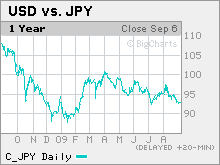Selecting currency
How the average investor can get a taste of foreign tender
NEW YORK (Fortune) -- Investing in currencies is tricky for the average person. The traditional alternative, buying foreign stocks, doesn't offer the diversification of currency investing because such stocks are often correlated to U.S. equities.
Foreign bonds have their own downside: interest rate risk. Still, investors should put about 5% of their assets in currencies, argues Samson Capital's Jonathan Lewis, who notes that their asset class held up better than stocks during the financial crisis.
One way to get a taste of foreign tender, says Morningstar's Bradley Kay, is through the SPDR DB International Protected Bond (WIP) ETF. The fund has returned 14% so far in 2009 (it launched in 2008), and consists of inflation-linked bonds issued by countries like Canada and France. It's the only international inflation-linked bond fund, according to Morningstar.
They're not 100% correlated to currencies, but bonds of commodities-driven countries should strengthen in a recovery, while other should hold up in crises. As with TIPS in the U.S., the bonds' principal is adjusted in line with inflation, offering protection against interest rate risk.
Some exchange-traded funds do allow for direct investments in currencies, functioning as though investors are buying bank accounts overseas. While bonds and equities are generally better investments, these ETFs can be used as hedging tools, says Scott Burns, Kay's colleague at Morningstar. For people working abroad, shorting these ETFs could be one way to mitigate losses in wages incurred from currency translation.
But for investors who do want to directly bet on currencies, Morningstar says the most popular ETF with about $545 million in assets under management is CurrencyShares Japanese Yen Trust (FXY).
The fund invests in an interest-yielding Japanese bank account and provides "pure exposure to the yen's movements against the dollar," according to Morningstar. But it's "only suitable as a small speculative bet when not used for hedging purposes," Morningstar warns. The fund is up almost 16% over a one-year period and about 27% since its launch in 2007.
ETFs with a broader focus, such WisdomTree Dreyfus Emerging Currency (CEW), don't limit investors to a single currency. The WisdomTree fund is up about 6% since its launch in May, according to Morningstar.
Burns says these funds can also be used as hedging tools. Investors can go long on the equity performance of emerging markets while shorting the ETF to protect against losses again through currency translation. ![]()
-
 The retail giant tops the Fortune 500 for the second year in a row. Who else made the list? More
The retail giant tops the Fortune 500 for the second year in a row. Who else made the list? More -
 This group of companies is all about social networking to connect with their customers. More
This group of companies is all about social networking to connect with their customers. More -
 The fight over the cholesterol medication is keeping a generic version from hitting the market. More
The fight over the cholesterol medication is keeping a generic version from hitting the market. More -
 Bin Laden may be dead, but the terrorist group he led doesn't need his money. More
Bin Laden may be dead, but the terrorist group he led doesn't need his money. More -
 U.S. real estate might be a mess, but in other parts of the world, home prices are jumping. More
U.S. real estate might be a mess, but in other parts of the world, home prices are jumping. More -
 Libya's output is a fraction of global production, but it's crucial to the nation's economy. More
Libya's output is a fraction of global production, but it's crucial to the nation's economy. More -
 Once rates start to rise, things could get ugly fast for our neighbors to the north. More
Once rates start to rise, things could get ugly fast for our neighbors to the north. More








